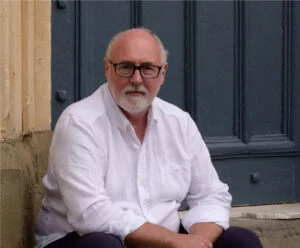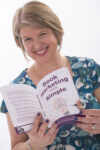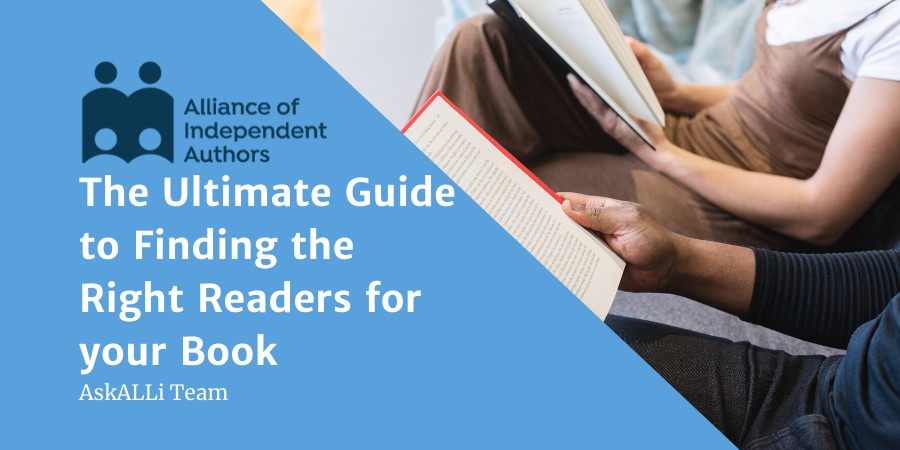As self-publishers, our readers are our greatest asset and our ability to publish directly to them is our greatest opportunity. Finding the right readers is critical to our success. Which is why this week’s #AskALLi Ultimate Guide gives you everything you need to know to find the right readers for your book.
These weekly advice posts draw on the group wisdom and experience of the advisors and members of the Alliance of Independent Authors (ALLi). Our thanks to all who shared whether through discussions in our member forums or more formally in submission and presentations. For this post, special thanks to Tom Evans, nonfiction and fiction author and meditation maestro; Helena Halme, fiction and nonfiction author and ALLi Nordic Ambassador, Ann Richardson, author of books on health and social care problems; and Karen Williams, ALLi Partner Member and Book Mentor. (links below)
Newsflash: Not everyone is going to like your book.
Some authors get this as soon as it is explained but a surprising number are wedded to the idea that their books are not niche.
If you ask authors who their book is aimed at, the most common answer is “everyone”, or some variation of that. “It's for the general reader.” Or: “Most people would find it interesting.” Or: “I don’t know, I didn’t write it a reader in mind.” But take off your author hat for a second and put on your reader hat. Before you ever wrote a word, you were a reader and even before you could read, you were constantly being told stories by your parents, friends and loved ones. These stories feed into the books you want to read today.
Our upbringing plays a huge part in our likes and our dislikes, our preferences, tastes and opinions and our reading taste is also determined by factors like age, gender, sexuality, income level, social standing, political beliefs and more.
This isn’t to say that our personal tastes don’t grow, shift or evolve as we do–but it does mean that we have types of books that we like to read, and other kinds that we dislike. And that there are entire library shelves of books we completely ignore, never even think about.
In the old days, before digital publishing, publishers had to market far and wide but now book marketing is all about focussed and narrow. It's not too often we mention pornography on the ALLi blog but Orna Ross has an observation that is relevant here.
I always remember an interview I did with Carole Vance, one of the world's leading sexologists, around research that found any particular item of pornography elicits a variety of responses in people Her findings indicated that it will be effective for one-third of people, to varying degrees, leave one third feeling neutral, while the other third will actively dislike it. I thought then, and I believe still, that the same is probably true of every piece of writing or content. Even if it isn't, it's a good way to think about it.”
No matter how good a job you've done as a writer or publisher, one-third will just not like that sort of thing and one-third will be indifferent. But one-third of all the readers out there have the capacity to enjoy your book to varying degrees.
It's those readers who are most likely to most enjoy it most that we hold in mind and aim to reach. The kind of reader who will completely spread the word to others who like that kind of book.
Aim for those and forget the rest.
Authors sometimes resist this advice. We want to think big. We want a big audience and we think that means a wide audience. Thinking about one reader, no matter how right, how ideal, just doesn’t excite us.
If you’ve fallen into this camp up to now, that’s ok, but it’s time to start thinking in a more focussed way about your genre, niche, and micro-niche if you want to attract readers who get you and your books. Your very own “right readers”.
Your Right Reader is Not Likely to be an Author
In his 2000 craft book On Writing, Stephen King says,
Someone once wrote that all novels are really letters aimed at one person. As it happens, I believe this. I think that every novelist has a single ideal reader; that at various points during the composition of a story, the writer is thinking, ‘I wonder what he/she will think when he/she reads this part?’
For King, his ideal reader is his wife, the novelist, Tabitha King. One of his favorite parts of the writing process is giving her pages of his book and listening as she reads, waiting for her to gasp or laugh, to tell him when the writing is working, when not.
This led many writers to confuse ideal readers with other authors. Your ideal reader might be another author, and you might even ask them to be one of your beta readers, but other authors shouldn't be top of mind as you market your books.

Historical novelist David Penny puts his readers first
David Penny, author of the Thomas Berrington Historical Mysteries set in the final ten years of Moorish Spain, makes a plea for indie authors to focus on marketing to their readers.
I like talking with writers. I love nothing better than attending conferences or sitting down to discuss how we create what we do, what problems we encounter, and how we get over them. But I discovered that who I need to talk to on social media are readers. Not writers, although they read too, but there are a lot less of them, and they read differently.
When I acted on this, my daily sales rose from, well, quite often nothing, to between 60-120 books a day. For the last two years I’ve been selling close to 24,000 books a year. No, it doesn’t make me a bestseller, but it does plant me firmly in the mid-list of authors, and generates well above the median author income. Marketing isn’t hard. Making up your mind to concentrate only on what is effective is much harder.
Finding The Right Readers For Your Book

So how do you find your right readers? First, by understanding your brand and your books intimately enough to tease out their potential benefits, advantages, points of difference, uniqueness and angles.
What’s your hook? What particular aspects of this book make it compelling or entertaining or inspiring? Why would a book buyer choose this book over one that's comparable?
What we’re really focussing on here is what attracts our biggest fan.
We must understand who they are, what it is about them that makes them right for us, and what it is about our books that makes them right for them. We can do this for your work as a whole, for different series or for each book if we write across genres.
Please don't interpret this as advice to write to market. You know: “My ideal reader would love this story and not that one, so I’ll spend the next few months writing this new book and doing everything to ensure he or she is going to love it.” There's no need for that these days and it's not how marketing works any more (if it ever was).
Write your book(s) because they are meaningful to you, knowing others will feel the same. There are plenty of tips and hacks you can use to boost sales for a certain period, during launch or promotion, but a long-term connection with readers comes from shared values and interests with the right readers.
Finding The Right Readers: Profiling Readers
Answer the following questions to get a picture of your right readers, as a person:
- Age
- Gender
- Sexuality
- Race / Ethnicity / Nationality
- Education level
- Occupation
- Hobbies and interests
- Class: aristos, upper-middle, middle-middle, lower-middle, working-class, unemployed? (most readers are middle class.)
- Urban or rural?
- Married or single?
- Parent or childfree?
- Spirituality or religious affiliations?
- Which generation are they: Boomer? Gen X, Y or Z?
- Where does your right reader live: with their parents, alone, with their own family?
- Where do they vacation?
- Attitude to health and fitness
- Describe their lifestyle.
- Describe their childhood and family history
- Describe their relationships
- Describe their beliefs, goals and values
- Any noteworthy attitudes?
- What occasions, feasts, celebrations are important to them?
- Pet peeves or irritations
- Political leanings
- Fears, worries, and frustrations
- Secrets or fantasies
- Anything you want to add?
And as a reader:
- What outcome do they most want from their reading? Information, education, entertainment, inspiration? Romance, adventure, thrills, shock, awe? To laugh, cry, be scared? To learn, transform, grow?
- Emotion or intellect?
- Mac or PC?
- Amazon or Apple?
- Favorite format: ebook, print, audio?
- Favorite device: reader, phone, print books only
- What are their buying patterns? How price sensitive are they?
- Where are they in terms of readiness to buy? (Already read the first book in your series?)
- Types of books they read (other than the type you write)
The answers to these questions need to be more than guesswork. Take time to consider them and find evidence to back your hunches. If you currently have an email list, even if it’s small, poll your readers and ask them to complete a survey to better understand what they need and want from you.
Ask questions: in your emails, in comments on your own blog and others. Join forums and clubs that discuss your topic or genre. Learn from other writers in your genre.
Finding The Right Readers: Niche and Micro-Niche
Once we have the answers to these questions, we start to have more understanding of who your actual readers are. We realize that not all writing fits these readers and why your writing does.
Every writing niche has avid fans who are hungry for talented writers. Once you have cracked your niche and micro-niche you have found a long-lasting and loyal fanbase.
Some examples of niches could be:
- Fantasy thrillers
- Dark coming of age dramas
- Steampunk fiction
But even within these subgenres your books are going to part of a micro-niche. A micro-niche is like a sub-subgenre and once you identify this you can start really homing in on your audience with bespoke marketing, some micro-niche examples are:
- Edwardian-set fantasy thrillers
- Dark coming of age dramas with magic realsim
- Romantic steampunk fiction
FIND YOUR MICRONICHE: Try to think broadly about what niche your books fit into and then try and narrow it down even further:
- What types of characters do my books have?
- What themes crop up again and again?
- What tone do they have – do they tend to skew lighter or darker?
- Is there comedy and if so how is it used?
- When choosing a micro-niche balance is key. We want to be specific but we don’t want to be so specific that we’re boxing ourselves into a corner. E.g. ‘books with female ensembles and bubbling family secrets’ you’re leaving lots of room for interpretation while still homing in on a certain type of reader.
Segment to Sell to the Right Readers: Orna Ross
The Right Reader principle is this: aim your book obviously and exclusively at fans of your micro-niche only.
It’s not just about pointing your ads at the right adset in Facebook, it’s a principle and philosophy that must permeate all: your ads and social media if you do those, yes, but also the book's description and cover, categories and keywords, the story itself and you. Your author branding. The beginning and end matter. How you speak to readers as you hook them into your email and newsletter lists.
Enshrine that core principle of engaging the right readers, and only the right readers, in everything you do as an author and publisher and business owner.
If you work in more than one genre, you have to do all this more than one, with different content for each reader in each genre.
Orna Ross, Director of ALLi
When I began self-publishing, I got this all wrong. I write across three macro-genres–poetry, nonfiction and fiction-and I put almost everything out to everyone.
I did separate out ALLi mailings about self-publishing but on my author website I carried non-fiction, fiction and poetry, and when someone signed up to my author mailing list, they got news about the lot. If they followed my blog, or one of my social platforms they'd have the same experience– everything arriving at them, as it occurred to me.
I learned very late in the game that this is confusing and even irritating for many readers. Readers attracted to my historical family dramas didn't want ruminations on creativity and creativism. Poetry readers just wanted poetry news.
It sounds so obvious to me now but it was obscured for me by those who were interested in it all. But while such broad-based readers may appreciate all you do, they too can be confused about how to engage with you.
It wasn’t until I segmented my readers and gave them each what they were after that I saw steady growth. The first shift in my perspective was when I isolated my micro-niches. I did that by asking the questions below and f-r-e-e-writing the answers to myself.
- “What does an inspirational poetry fan actually want from a feminist poet?”
- Genre: Poetry. Niche: Inspirational poetry. Micro-niche: womanist inspirational poetry. Mini-micro-niche: Irish womanist inspirational poetry.
- “What would a historical fiction fan with a bent towards multi-generational family stories most love to receive from a novelist?”
- Genre: Historical fiction. Niche: Historical family fiction. Micro-niche: Time-slip historical family fiction. Mini-micro-niche: Irish time-slip historical family fiction
- “What help do today’s indie authors, and other digital creative entrepreneurs running passion-powered businesses, most need from an author and how do they want to receive it?”
- Genre: Business books. Niche: Creative business books. Micro-niche: Digital creative business books.
I made Instagram the home for my poetry, Facebook where I post extracts from my fiction and connect with non-fiction groups. And on Twitter I now I tweet only about the writing life and creativism.
This sort of specific targeting feels right not just because it opens a clear pathway for those who want to buy particular books, but because it has created far more meaningful conversations (and helped me write more words, but that's another story).
How Knowing your Right Reader Improves Craft
Identifying and defining the right readers for your book is an exercise in honing and improving your craft. Your writing craft, in that knowing who you’re writing for helps you to write in a more personal and directed way. And your publishing craft, in that knowing who your book is targetted towards is essential to marketing, promotion, sales and licensing.
The point of thinking about the right reader, singular, is to hone our targetting. To get our work to the people who are most likely to resonate with it and buy it. This means using language and imagery, story and style, voice and vision and worldview that appeal to that specific reader–and from there, to all the readers who are like that reader, around the world.
Decisions about plot, setting, language, theme, kind of sex, degree of violence, and more make themselves. You ask yourself, “What would my right readers want?”
Marketing and promotion decisions also become much more targeted.
Use your reader profile to make decisions about where and how to promoted and advertise your books. If you work with a freelance or marketing service, give them your reader profile.
Thinking in terms of right readers is a key tool of any author's box. Give it a try to see how incredibly powerful it can be.
Finding The Right Readers for your Book: Case Study Helena Halme

Helena Halme
I write Nordic romance and I have worked hard to find readers who love the region for my books. As well as making sure the metadata is correct (I use the Scandinavian fiction category for all of my books), I've also targeted ex-pat Finns in the UK and the US. I have a small fanbase in the Finnish Embassy, Finnish Church, and Finnish Institute in London, and Finnish expat groups on FB. They buy my books as soon as they are out, but they also spread the word.
I've advertised in a magazine issued each year to FinnFest participants in the US (there are 600,000 Finns in the US) and always try to take part in events and discussions on social media on Nodic Noir or Scandi fiction in general.
I use #Nordicfiction on Instagram and generally try to ‘own' the Nordic literature scene online. I was lucky enough to appear on Joanna Penn's Books and Travel podcasts before Christmas where I talked about Finland. On top of this niche marketing, I am building my email lists with various free offerings (a novella, a short story, and exclusive additional chapters to my novels). My books are stocked in places where they are set (Åland Islands and the Swedish ski resort, Åre) and I've appeared in local newspapers.
At the moment, I'm working with Ethan Ellenberg (US agent) to sell my translation rights to the Nordic region. Unfortunately, Amazon hasn't (yet) conquered Scandinavia, so ebooks aren't as popular there as physical books. I am fully poised for the day that Jeff Bezos takes the plunge into the icy waters of the Baltic.
Both my latest titles The Island Affair and An Island Christmas were #1 New Releases in the Scandinavian Literature category on Amazon, and An Island Christmas was a #2 bestseller in the same category all of December.Last, I analyze (and continuously do so) best-selling books in my genre (women’s fiction/romance/Scandinavian Lit) and take note of the structure of the story, cover design, blurb, and categories to try and focus deeper into the right readership on top of the basic positioning of my books in the market place.
Finding The Right Readers for your Book: Case Study Ann Richardson

Ann Richardson
I wrote Celebrating Grandmothers, in which a large number of grandmothers talk about how it feels to be a granny, because I thought it would be interesting, but I assumed that the main audience would be grandmothers themselves. And, of course, they are the main people who read it. But just as children’s books are not bought by children, books about and for grandmothers are not so often bought by them.
I realised over time that the main purchasers were people wanting to buy a gift for a grandmother. Mostly, these are grown-up children who have recently had children themselves, but it is also grandfathers buying for their wives and even great-grandmothers buying it for their daughter. It is very difficult to think of anything novel to buy for an older woman (we don’t need anything and are usually trying to get rid of stuff) and this is a perfect solution. Some people even think I chose the title for this purpose, but it was just a happy accident.
Finding The Right Readers for your Book: Case Study Tom Evans
Tom Evans, author
Back in 2009, I wrote a book on how to clear writer’s block. A year later, I wrote another on how to tap into light bulb moments. I then began to write at least one book a year and I became adept at writing books, but not so good at selling them.
At the time, the conventional wisdom was to offer something free to people who had made a small purchase in exchange for their email so that you could sell them something more expensive. I’d become an author’s mentor and ran workshops and delivered some one-to-one mentoring, so this made sense. I created a number of meditations that accompanied the books and made them free for readers, with a link inside the books.
I had a modicum of success with this tactic but, of course, my ideal readers didn’t know I even existed, never mind that I’d written a book or three.
Roll on about 10 books, and 7 seven years, and one of my free meditations got picked up by a free app called Insight Timer. Within a month of it being on the app, 6000 meditators had listened to it. They loved the British accent and the fact that I made meditation fun and accessible.
Two years later, my meditations had been listened to for free over 1 million times and meditators who I didn’t know started to buy my books. The right readers had found me. They were people who were existing meditators or those learning to meditate. I had no idea this was my ideal target market.
As of the start of 2020, when I published my 16th book and 1st novel, Soulwaves, my meditations had reached over 2.3 million pairs of ears. Now I am able to plug my unprecedented access to the right readers directly into the marketing plan for the novel. Each month, I am releasing two meditation tracks, one guided with my voice and one with just relaxing ambient music inspired by the book. Meditators are just gravitating to the book. Having the audiobook version available from the outset was of course part of the strategy.
I am only a month into launch but getting great feedback from the few who found the book first and are reading or listening to the book and experiencing states of consciousness the book describes with the companion meditations. It is becoming a multimedia and multi-sensory experience for them. Most importantly many new readers are finding the book by enjoying the meditations first and then telling their friends too.
I guess my main learning is that if you keep generating quality content, and are tenacious and persistent, the right readers will find you.
Find out more about Tom on his website, and on InsightTimer
Finding The Right Readers for your Book: Advice and Tips from Karen Williams

Karen Williams, The Book Mentor
When I wrote my first non-fiction book in 2009, I’d recognised a need for my book in a particular niche market. I used my book to reposition myself in this niche, which is one of the reasons it was a success. As a book mentor since 2014 supporting business authors, most of my clients are using their books as an extension of their business rather than a standalone product, and I encourage them to get really clear on their target readership before they start writing it.
Although some people are loathe to niche too deeply, unless you know who your book is for, and you write your book for this person, it’s less likely to get into the hands of those who need to read it. If you’re too broad with your message, then it won’t hit the mark. And, when it comes to marketing, you’ll be spreading yourself too thinly as you won’t be clear where to put your focus.
My biggest learning is that your first book may not be THE book. My own business has evolved hugely in the last 11 years, and each of my six books have been positioned and packaged very differently. So be prepared to evolve as your industry, your message and client base may change.
Find out more about Karen on her website.







This was so informative. Thank you. Well Done!!!!!
The above advice is pertinent to my cross genre novels featuring women in dynamic careers facing a crisis.
Micro-niche: women’s empowerment – – Mini-Micro niche: a woman supportive friends
Thank you in advance for any author who wishes to comment.